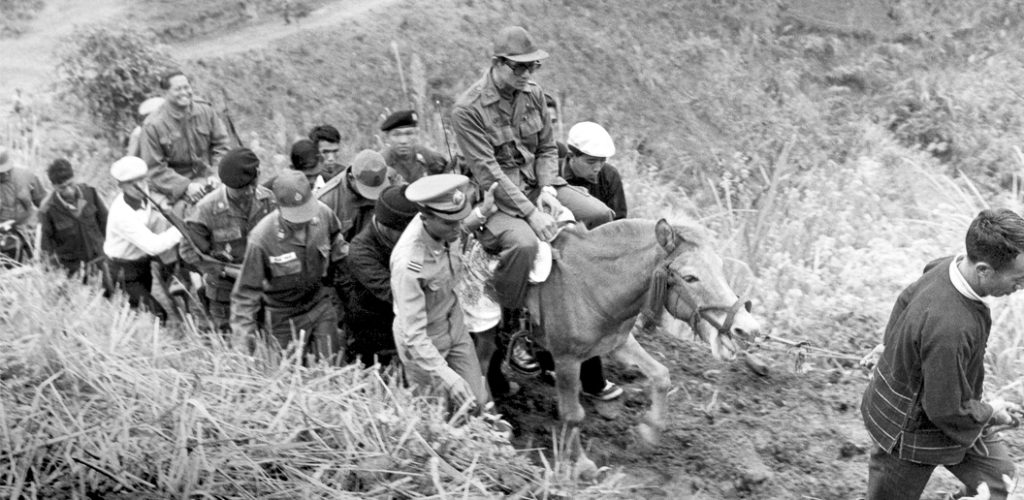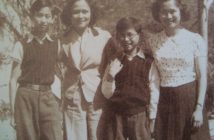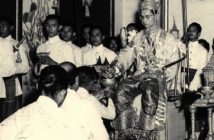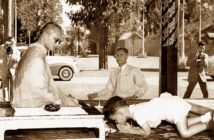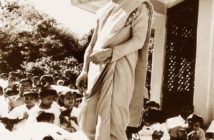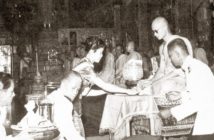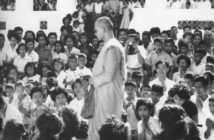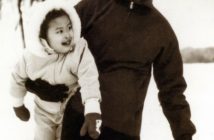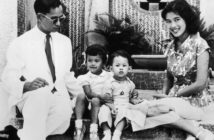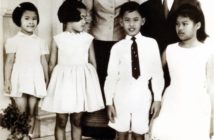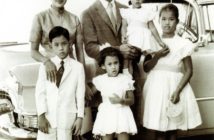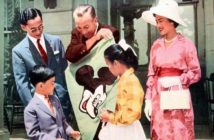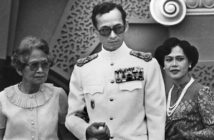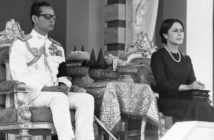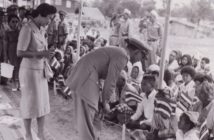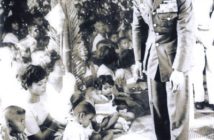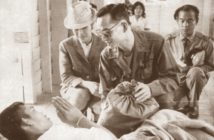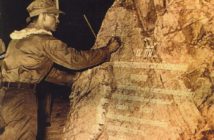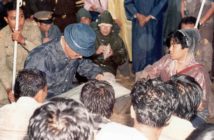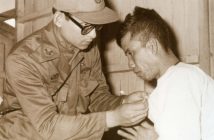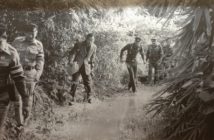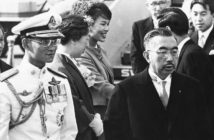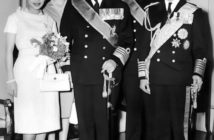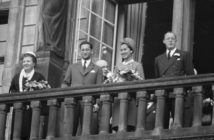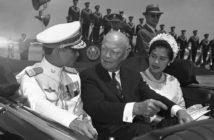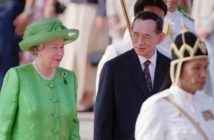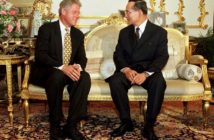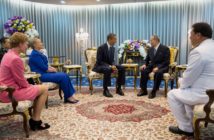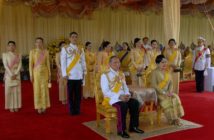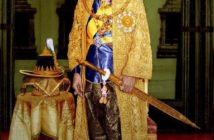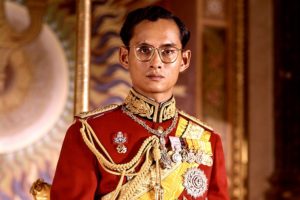 No one in the history of the Kingdom of Thailand has done so much to improve the well-being of its people as His Majesty King Bhumibol Adulyadej, also known as Rama IX. He has initiated literally thousands of development projects that have greatly benefited the country and its people. His reign spanned the terms of more than 30 governments, several military regimes, coups and numerous coup attempts, and even the defeat of the communist threat that raged through Southeast Asia a few decades ago.
No one in the history of the Kingdom of Thailand has done so much to improve the well-being of its people as His Majesty King Bhumibol Adulyadej, also known as Rama IX. He has initiated literally thousands of development projects that have greatly benefited the country and its people. His reign spanned the terms of more than 30 governments, several military regimes, coups and numerous coup attempts, and even the defeat of the communist threat that raged through Southeast Asia a few decades ago.
“We shall reign with righteousness for the benefits and happiness of the Siamese people.”
This declaration, spoken by His Majesty at his coronation ceremony was his first public pledge to promote the welfare of all his subjects. Throughout his 70 year reign he has fulfilled this promise to the letter. Early on His Majesty was inspired by the example of his parents to work tirelessly to improve the lives of the Thai people. Although most of his childhood was spent in the West, he was taught to be aware of his roots and his debt to the Motherland. This attitude formed a solid foundation for a deep understanding of Thai society.
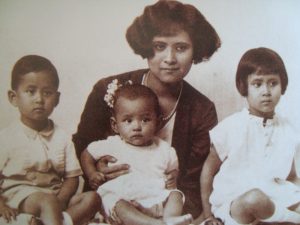 King Bhumibol Adulyadej was born on the 5th of December of 1927 in Cambridge, Massachusetts with the simple name of “Baby Songkla”, a name he was given while waiting for his uncle, King Prajadhipok, to present him with a name of propitious origins. His father, Prince Mahidol Adulyadej, was enrolled at Harvard University at the time, so the entire family was living in the United States. The room in which he was born was given temporary status as Thai territory, for him to be able to enjoy a birth in home territory. In consultation with his uncle, King Bhumibol Adulyadej, which stands for “Strength of the land and incomparable power,” was the newest member of Thailand’s Chakri dynasty.
King Bhumibol Adulyadej was born on the 5th of December of 1927 in Cambridge, Massachusetts with the simple name of “Baby Songkla”, a name he was given while waiting for his uncle, King Prajadhipok, to present him with a name of propitious origins. His father, Prince Mahidol Adulyadej, was enrolled at Harvard University at the time, so the entire family was living in the United States. The room in which he was born was given temporary status as Thai territory, for him to be able to enjoy a birth in home territory. In consultation with his uncle, King Bhumibol Adulyadej, which stands for “Strength of the land and incomparable power,” was the newest member of Thailand’s Chakri dynasty.
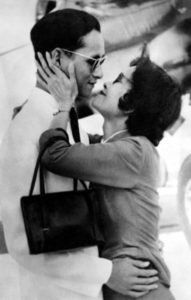 Shortly after his birth, when King Bhumibol was only two years old, his father, Prince Mahidol, passed away due to kidney failure. At this point, King Bhumibol was taken to Switzerland to complete his education at the École Nouvelle de la Suisse Romande, where he developed a passion for photography and jazz, making him an avid player of the saxophone, a trait he would retain throughout his life. While there he became a fluent French speaker, adding to his fluency in English and Thai. King Prajadhipok abdicated in 1935, leaving the throne of Thailand under a period of regency, and upon the death of his brother, then formal heir to the throne, King Bhumibol was left with the difficult task of assuming the leadership of the throne the moment he turned eighteen. Far from being intimidated by the magnitude of the role, King Bhumibol took the challenge with honour, changing his major to Political Science and enrolling in a school of law to begin preparing for the task of becoming the monarch of a country in his teens. He met Sirikit Kitiyakara in France, a beautiful Thai aristocrat whom he would later marry in 1950, just a week before a coronation that would proclaim them the King and Queen of Thailand.
Shortly after his birth, when King Bhumibol was only two years old, his father, Prince Mahidol, passed away due to kidney failure. At this point, King Bhumibol was taken to Switzerland to complete his education at the École Nouvelle de la Suisse Romande, where he developed a passion for photography and jazz, making him an avid player of the saxophone, a trait he would retain throughout his life. While there he became a fluent French speaker, adding to his fluency in English and Thai. King Prajadhipok abdicated in 1935, leaving the throne of Thailand under a period of regency, and upon the death of his brother, then formal heir to the throne, King Bhumibol was left with the difficult task of assuming the leadership of the throne the moment he turned eighteen. Far from being intimidated by the magnitude of the role, King Bhumibol took the challenge with honour, changing his major to Political Science and enrolling in a school of law to begin preparing for the task of becoming the monarch of a country in his teens. He met Sirikit Kitiyakara in France, a beautiful Thai aristocrat whom he would later marry in 1950, just a week before a coronation that would proclaim them the King and Queen of Thailand.
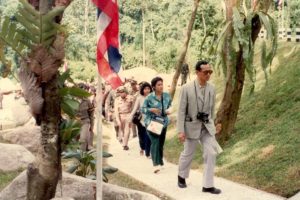 His Majesty made many visits to rural areas throughout Thailand. Accompanied by Her Majesty Queen Sirikit, His Majesty visited the least developed areas of the country to see how the people lived. The royal couple travelled to every part of the country, visiting villagers and learning of their living conditions, problems and needs at first hand.
His Majesty made many visits to rural areas throughout Thailand. Accompanied by Her Majesty Queen Sirikit, His Majesty visited the least developed areas of the country to see how the people lived. The royal couple travelled to every part of the country, visiting villagers and learning of their living conditions, problems and needs at first hand.
His Majesty would then begin the process of devising schemes and projects to resolve their troubles and improve their conditions. Scenes of His Majesty sitting on the ground or standing shoulder to shoulder with his subjects, engaged in conversation, became a familiar sight that touched all Thai people.
The Royal Development Projects (RDPs) were directly inspired by the insight His Majesty gained while visiting rural areas. He realized that any projects that truly improved the lives of the people must go hand in hand with protection of the environment and sustainable use of natural resources.
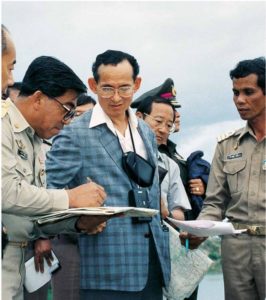 In his lifetime, there were over 4,000 Royal Development projects to help the Thai people. The very first was initiated in 1951, when His Majesty authorized the Department of Fisheries to acquire Tilapia Mozambica fish from Penang through the UN’s Food and Agriculture Organization. The fish were initially raised in the pond at the Ambarra Villa of the King’s Dusit Palace in Bangkok. On November 7, 1953, His Majesty distributed the fingerlings to village and district leaders throughout the country for propagation and further distribution among the rural people to provide them with an alternative source of protein.
In his lifetime, there were over 4,000 Royal Development projects to help the Thai people. The very first was initiated in 1951, when His Majesty authorized the Department of Fisheries to acquire Tilapia Mozambica fish from Penang through the UN’s Food and Agriculture Organization. The fish were initially raised in the pond at the Ambarra Villa of the King’s Dusit Palace in Bangkok. On November 7, 1953, His Majesty distributed the fingerlings to village and district leaders throughout the country for propagation and further distribution among the rural people to provide them with an alternative source of protein.
King Bhumibol was never interested in a jet-set life. He stopped traveling abroad, saying there was too much to do at home. He was content to trudge through croplands in distant provinces in an open-neck shirt and sport coat, tending to the many development projects he encouraged and oversaw: milk pasteurisation, plants, dams that watered rice fields, factories that recycled sugar-cane stalks and water hyacinths into fuel, and countless others.
In a political crisis, Thais admired him for his shrewd sense of when to intervene — sometimes with only a gesture — to defuse it, even though he had only a limited constitutional role and no direct political power.
“We are fighting in our own house,” he scolded two warring politicians he had summoned to sit abjectly at his feet in 1992. “It is useless to live on burned ruins.”
Thailand was transformed during his reign, moving from a mostly agricultural economy to a modern one of industry and commerce and a growing middle class.
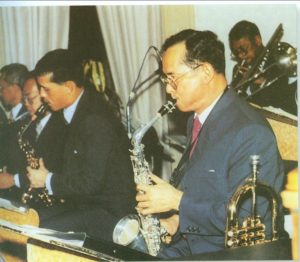 King Bhumibol was accomplished in many arts. He was a painter, a photographer, a musician and an author. One of his favorite passions was music. He was an accomplished jazz saxophone player and composer, playing Dixieland and New Orleans jazz. He also mastered the clarinet, trumpet, guitar, and piano.
King Bhumibol was accomplished in many arts. He was a painter, a photographer, a musician and an author. One of his favorite passions was music. He was an accomplished jazz saxophone player and composer, playing Dixieland and New Orleans jazz. He also mastered the clarinet, trumpet, guitar, and piano.
The King wrote 49 compositions, including marches, waltzes, Thai patriotic songs, and jazz swing ( his most abundant). His most popular compositions were Candlelight Blues, Love at Sundown, and Falling Rain, all composed in 1946. His musical influences included Louis Armstrong, Sidney Bechet, Benny Carter, and Johnny Hodges.
In the January 10th 2006 edition of the Bangkok Post Newspaper, an article appeared with the title “The Jazzy King”. The article described how on Saturday nights a group of some 10 professional and amateur musicians, most in their 60s and 70s, gathered together near the beach in Hua Hin at a place called Klai Kang Won for a jazz rendezvous.
The well-seasoned musicians took their time to find their seats. With instruments in hand, lips to the mouthpiece, fingers to the keys, they patiently waited until the band leader looked up, and said “Ready”? Suddenly, as if rejuvenated by the spell of the music, the gray-haired band members would come alive with youthful exuberance, adroitly creating sounds as fresh as musicians in their prime.
On the saxophone was none other than His Majesty King Bhumibol Adulyadej. Until the wee hours of Sunday morning, the King and his Au Sau Wan Suk Band members would fill the sultry air of Hua Hin with smooth jazz from a wide selection of styles: Dixieland, New Orleans, Big Band chart-toppers: sometimes with an interlude of one of the King’s own compositions.
Until his retirement from public performance some three decades ago, the King had awed Thai audiences with cool jazz, then novel to Thai society. In weekly Friday night radio broadcasts, sometimes taking phone requests, he and his band would play at universities and public stages. This went on from the early 1950s through to the 1970s.
As if a king blowing his sax for the joy of his subjects wasn’t remarkable enough, His Majesty also made Thailand internationally famous for his role as a highly-recognized musician, particularly in the jazz world. His name has been listed on jazz websites and in jazz encyclopedias, from the esteemed Vienna Music Academy in Austria to the coveted Yale Music School in the United States.
Over several decades, the King’s Au Sau Wan Suk Band received such international jazz idols as Benny Goodman, Lionel Hampton, Jack Teagarden, James Moody, Benny Carter, Les Brown, Maynard Ferguson, The Preservative Hall Jazz Band, and many more as guest musicians for impromptu sessions. The late jazz icon Lionel Hampton was once quoted as saying: “He is simply the coolest king in the land”.
It is here with these idols that one could observe the King at his very best. Unlike when he plays with his house band, whose members are mostly amateurs, his Majesty would master his jazz supremacy with all the techniques he has acquired to match with these visitors.
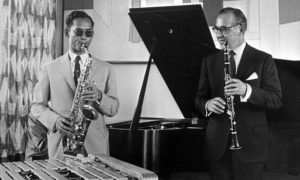 His Majesty’s first encounter with an international jazz idol occurred in 1960 during his state visit to the United States. His two jam sessions with Benny Goodman in New York were reported in Time Magazine in its June 18, 1960, edition: “His Majesty went to dinner with the King of Swing, Benny Goodman, (and 94 others) at the suburban estate of New York’s Governor Nelson Rockefeller. For 90 minutes after dinner, King Bhumibol and Benny led a foot-stomping, starch-melting jam session. The next day, the King toted a sax up to the 22nd story rooftop garden above Benny’s Manhattan House apartment for the fulfillment of a jazz man’s dream…. The King stood there toe-to-toe for two hours and paid his royal respects to The Shiek of Araby (in 17 ear-drumming choruses). He savoured Honeysuckle Rose and swung low On the Sunny Side of the Street.”
His Majesty’s first encounter with an international jazz idol occurred in 1960 during his state visit to the United States. His two jam sessions with Benny Goodman in New York were reported in Time Magazine in its June 18, 1960, edition: “His Majesty went to dinner with the King of Swing, Benny Goodman, (and 94 others) at the suburban estate of New York’s Governor Nelson Rockefeller. For 90 minutes after dinner, King Bhumibol and Benny led a foot-stomping, starch-melting jam session. The next day, the King toted a sax up to the 22nd story rooftop garden above Benny’s Manhattan House apartment for the fulfillment of a jazz man’s dream…. The King stood there toe-to-toe for two hours and paid his royal respects to The Shiek of Araby (in 17 ear-drumming choruses). He savoured Honeysuckle Rose and swung low On the Sunny Side of the Street.”
King Bhumibol was inducted as an honorary member of Vienna’s University of Music and Performing Arts. In 2000, he was awarded the Sanford Medal for his contribution in music from Yale School of Music. He was the first Asian in both cases to be honored as such. In 2003, the University of North Texas College of Music awarded him an Honary Doctorate of Music. King Bhumibol’s influence is widely regarded as one reason why Thailand, and Bangkok in particular, has for decades had a strong jazz and improvised music “scene” relative to other Asian nations.
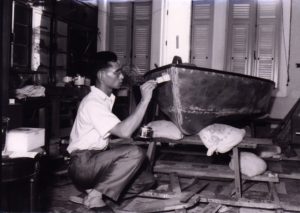 In addition to music, King Bhumibol was an accomplished sailor and sailboat designer. He won a gold medal for sailing in the Fourth Southeast Asian Peninsular (SEAP) Games in 1967. Together with HRH Princess Ubol Ratana they tied for points. This accomplishment was all the more remarkable given Bhumibol’s lack of binocular depth perception.
In addition to music, King Bhumibol was an accomplished sailor and sailboat designer. He won a gold medal for sailing in the Fourth Southeast Asian Peninsular (SEAP) Games in 1967. Together with HRH Princess Ubol Ratana they tied for points. This accomplishment was all the more remarkable given Bhumibol’s lack of binocular depth perception.
On April 19, 1966, His Majesty sailed the Gulf of Thailand from Hua Hin to Toey Ngam Harbour in Sattahip, covering 110 km (60 nautical miles) in a 17-hour journey on the “Vega 1”, an OK Class dinghy he built. Like his father, a former military naval engineer, Bhumibol was an avid boat designer and builder. He produced several small sailboat designs in the International Enterprise, OK, and Moth classes.
King Bhumibol was also an inventor and the only Thai monarch to hold a patent. He obtained one in 1993 for a waste water aerator named “Chai Pattana”, and several different patents on rainmaking that were issued in 1999 and in 2003.
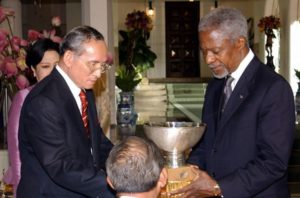 In 2006, then Secretary-General of the United Nations, Kofi Annan, helicoptered in to Hua Hin’s Klai Kang Won Palace to present King Bhumibol with a Lifetime Achievement Award from the United Nations Development Programme. “Your Majesty has made an extraordinary contribution to human development,” he said on presenting the award.
In 2006, then Secretary-General of the United Nations, Kofi Annan, helicoptered in to Hua Hin’s Klai Kang Won Palace to present King Bhumibol with a Lifetime Achievement Award from the United Nations Development Programme. “Your Majesty has made an extraordinary contribution to human development,” he said on presenting the award.
“As the world’s ‘Development King”, Your Majesty has reached out to the poorest and the most vulnerable people of Thailand – regardless of their status, ethnicity or religion – listened to their problems, and empowered them to take their lives in their own hands,” said Annan.
Annan also acknowledged Adulyadej’s “invaluable role in shaping the global development dialogue,” through his Sufficiency Economy Philosophy which emphasises: “moderation, responsible consumption, and resilience to external shocks.”
During his reign, King Bhumibol was instrumental through the periods of political instability that characterized Thailand across the Cold War, as well as through subsequent times leading right up to the present day. His figure, though apolitical, has been one of the greatest elements of national stability in Thailand, a feat that has elevated his image as a leader to levels of true admiration in the face of all Thais. Twelve coups, thirty Prime Ministers and various forms of civilian and military government since he first took office until the moment of his heartfelt passing, never seemed to perturb a society guided by the principles of hard work, sustainability and reconciliation that he so often preached. These were ideals he implanted upon the many projects initiated by his hand in the rural areas of what was previously a barren Thailand, teaching farmers the art of sustainable and consistent land development. Conservationist efforts also led King Bhumibol to be seen as a monarch engaged with social issues and environmental initiatives which to date stand strong across the country.
The passing of His Majesty King Bhumibol brings sadness to all Thais across the nation and the world due to their recognition of his determination in improving Thailand beyond the state of politics and affairs, a determination that will be both highly praised and sorely missed.


